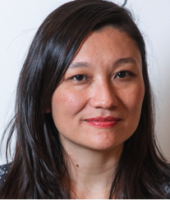Camila Perruso
Dr. Camila Perruso is a senior lecturer at the University of Paul-Valéry Montpellier 3 (ART-Dev) and affiliated researcher to the Institut d’études juridiques et philosophiques de la Sorbonne (CNRS/University Paris 1 Panthéon-Sorbonne). She holds a doctoral thesis entitled “The Right to a Healthy Environment in International Law” from the University of Paris 1 Panthéon-Sorbonne in co-supervision with the University of São Paulo (2019). She was an IAS Nantes fellow (2020-2021) on a project entitled “Crossing systems, crossing knowledge – indigenous peoples and environmental protection, and Member of the Centre for Studies and Research of the Hague Academy of International Law in 2022. Her research focuses on the interaction between human rights and the environment and climate change. She also works on indigenous peoples’ participation in making environmental norms.
Research Interests
International law, social sciences, ecological transition
Metamorphoses of Law(s)? A critical exploration of planetary boundaries and their meaning for the law relating to the environment
(Collaborative project, awarded a NetIAS Constructive Advanced Thinking grant, 2021-2024)
The consequences of climate change necessitate a transition to sustainability. In the age of the Anthropocene, Earth system scientists identified in 2009 one influential way of thinking about what sustainability means in more practical terms thanks to the “planetary boundaries”. The concept refers to 9 inter-acting biophysical thresholds, considered true boundaries that must not be crossed to avoid abrupt, non-linear, potentially catastrophic, and largely unpredictable changes in the environment and on the planet. However, 7 planetary boundaries have already been transgressed. The scientists proposed a shift away from the essentially sectoral analyses of limits to growth aimed at minimizing negative externalities, toward the estimation of a “safe operating space” for human development. But how can this concept of planetary boundaries be operationalised in social sciences and law?
To explore the potential of the concept in social sciences and law, the team aims to highlight three key areas: Biodiversity & Climate Interactions, Health & the Environment, and Technologies & Science. For each issue, three critical reading grids of the law(s) relating to the environment, meaning different fields of international and national law that protect the environment, human rights law, economic law, etc., are applied, articulating the items: identification of actors, participation process and emergence of solutions. The proposed interdisciplinary project (law and social sciences) is motivated by a sense of urgency to react across all disciplines.
Key Publications
- « L’ambition de et dans l’Accord de Paris », in Climate Change and the testing of International Law, Den haag Academy of International Law, Center for Studies and research, Jacqueline Peel & Sandrine Maljean-Dubois (Eds.), forthcoming 2023.
- La société écologique : normes et relations, with Rémi Beau, Christel Cournil et al, Paris, Les liens qui libèrent, 2023.
- Sur les chemins d’un Jus commune universalisable, with Mireille Delmas-Marty & Kathia Martin-Chenut (Eds.), Mare et Martin, 2021.
|
Online workshop organized by the "Constructive Advanced Thinking" Research Group led by Marion Lemoine-Schonne, 2023-2024 Paris IAS Fellow |
|
|
|
|

